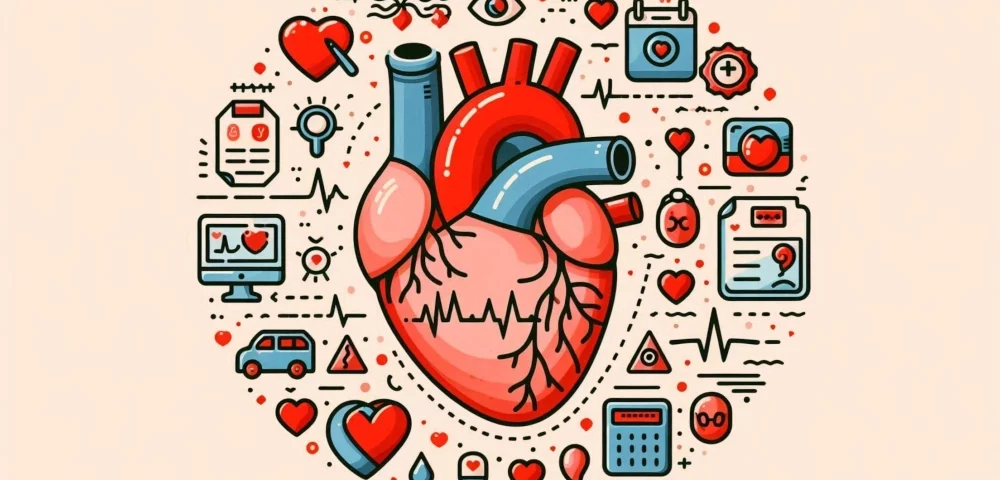
Living With AFib
June 4, 2024Atrial fibrillation (AFib) is a common heart condition characterized by an irregular and often rapid heart rate. It is estimated by the CDC that 6 million people in the US have AFib (expected to be 12.1 million by 2030) and it is the most common arrhythmia diagnosed in doctor’s offices. This condition can lead to serious complications such as stroke and heart failure if not properly managed. In this article, we’ll explore the causes, symptoms, treatments, including medication classes, and natural prevention methods for AFib.
Causes of Atrial Fibrillation
AFib occurs when the heart’s electrical system malfunctions, causing the upper chambers (atria) to beat irregularly and out of sync with the lower chambers (ventricles). Several factors can contribute to this malfunction (according to Focus Medica):
1. Heart-Related Causes:
- High Blood Pressure: Chronic high blood pressure can strain the heart and lead to AFib.
- Heart Disease: Conditions such as coronary artery disease, heart valve disease, and heart attacks can damage the heart’s structure and electrical system.
- Congenital Heart Defects: Abnormalities present at birth can predispose individuals to AFib.
2. Other Medical Conditions:
- Thyroid Disorders: Both hyperthyroidism and hypothyroidism can affect heart rhythm.
- Sleep Apnea: This condition can cause irregular heartbeats and increase the risk of AFib.
- Metabolic Disorders: Diabetes and obesity are significant risk factors.
3. Lifestyle Factors:
- Alcohol Consumption: Excessive drinking can trigger AFib episodes.
- Stimulants: Caffeine, tobacco, and certain medications can affect heart rhythm.
- Stress: Chronic stress and anxiety can contribute to the development of AFib.
Symptoms of Atrial Fibrillation
AFib symptoms can vary widely. Some people may not experience any symptoms, while others may have severe manifestations that require emergent medical care. According to the Mayo Clinic, common symptoms include:
- Heart Palpitations: A sensation of a racing, irregular, or pounding heartbeat.
- Shortness of Breath: Difficulty breathing, especially during physical activity.
- Weakness and Fatigue: Feeling unusually tired or weak.
- Dizziness or Lightheadedness: Feeling faint or dizzy.
- Chest Pain: Discomfort or pain in the chest, which can be a sign of a more serious condition.
Treatment Options for Atrial Fibrillation
The primary goal of AFib treatment is to maintain sinus rhythm and restore quality of life. This can be achieved by medications, procedures and lifestyle changes.
1. Medications:
- Antiarrhythmic Drugs: These medications help restore and maintain a normal heart rhythm. Common antiarrhythmic medications are Flecainide, Sotalol, Amiodarone.
- Rate Control Medications: Beta-blockers (e.g., metoprolol) and calcium channel blockers (e.g., diltiazem) help control the heart rate, according to Heart.org.
- Anticoagulants: Blood thinners such as warfarin, dabigatran, and apixaban reduce the risk of stroke by preventing blood clots.
2. Procedures:
- Electrical Cardioversion: A procedure that uses electrical shocks to restore a normal heart rhythm.
- Catheter Ablation: A minimally invasive procedure that destroys small areas of heart tissue causing abnormal electrical signals.
- Maze Procedure: Surgical intervention to create scar tissue that blocks abnormal signals1. This intervention is often coupled with cardiac surgery.
3. Lifestyle Changes:
- Diet and Exercise: Maintaining a healthy diet and regular physical activity can improve heart health and reduce AFib episodes.
- Stress Management: Techniques such as yoga, meditation, and biofeedback can help manage stress and reduce AFib triggers.
Natural Prevention of Atrial Fibrillation
While medical treatments are essential, natural prevention strategies can complement these efforts and help manage AFib:
1. Healthy Diet:
- Mediterranean Diet: Emphasizes fruits, vegetables, whole grains, and healthy fats, which can support heart health (according to doctors and research from Johns Hopkins).
- Limit Alcohol and Caffeine: Reducing intake of these substances can help prevent AFib episodes, according to Medical News Today.
2. Regular Exercise:
- Moderate Physical Activity: Regular exercise can improve cardiovascular health and reduce AFib risk (according to doctors and research from Johns Hopkins).
- Yoga and Tai Chi: These practices combine physical activity with stress reduction, benefiting overall heart health.
3. Weight Management:
- Maintain a Healthy Weight: Achieving and maintaining a healthy weight can reduce the strain on the heart and lower AFib risk, according to Healthline.
4. Stress Reduction:
- Mindfulness and Meditation: Practices that promote relaxation and reduce stress can help manage AFib.
- Adequate Sleep: Ensuring sufficient and quality sleep can prevent AFib triggers related to sleep apnea.
5. Avoiding Stimulants:
- Quit Smoking: Smoking cessation is crucial for heart health and reducing AFib risk.
- Limit Stimulants: Reducing intake of caffeine and other stimulants can help maintain a regular heart rhythm, according to Medical News Today.
Conclusion
Atrial fibrillation is a complex medical condition with various causes, symptoms, and treatment options. Understanding your specific triggers can help individualize and tailor your AFib management more effectively. Combining medical treatments with natural prevention strategies can improve outcomes and enhance overall well-being as well as quality of life. Always consult with a healthcare provider before starting any new treatment or making significant lifestyle changes to ensure they are safe and appropriate for your specific situation.


